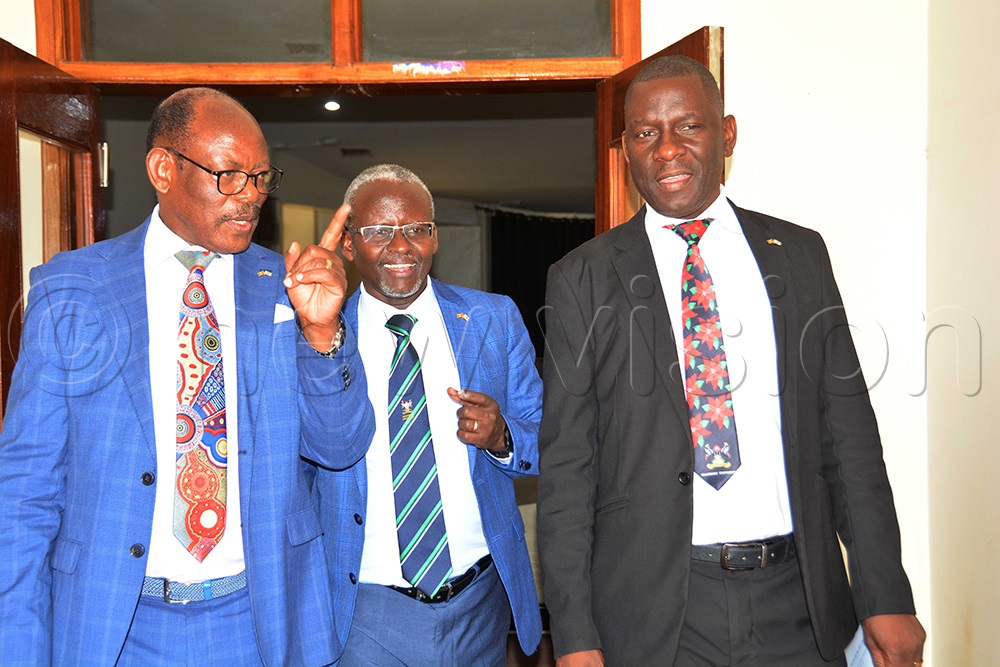Why Nawangwe wants professors barred from joining politics
"We have very few professors in Uganda and Africa. They should be making their contribution in the labs and lecture theatres because society heavily invested in them for that purpose," Nawangwe says.
The Vice Chancellor of Makerere University Prof. Barnabas Nawangwe (sixth right) and Associate Prof. Julius Kikooma (fifth left) on the front row pose for a group photograph with PhD students during the research dissemination workshop at School of Food Science conference hall in Makerere University on July 31, 2025. (Photo by Francis Emorut)
________________
Makerere University vice-chancellor Prof. Barnabas Nawangwe has advocated for banning professors from engaging in politics.
Nawangwe says he wants the professors to concentrate on research and supervision of PhD students.
He argues that there are few professors in the country and Africa at large, so the Government should bar them from joining politics.
"We have very few professors in Uganda and Africa. They should be making their contribution in the labs and lecture theatres because society heavily invested in them for that purpose," Nawangwe says.
L-R: The Vice Chancellor of Makerere University Prof. Barnabas Nawangwe, Prof. William Tayebwa Associate Prof. Julius Kikooma interacting after the opening of research dissemination workshop at School of Food Science conference hall in Makerere University on July 31, 2025. (Photo by Francis Emorut)
He adds that by joining politics, the professors are not adding any body of knowledge to solve the country's problems, especially getting Ugandans out of poverty.
"Why should professors be allowed to become Members of Parliament (MPs) and yet in the whole of Africa, there are not more than 30,000 PhD holders, and half of them come from South Africa. We have a burden to help the rest Africa," he said.
Without mentioning names, Nawangwe pointed out that some professors are busy politicking and are not contributing any knowledge to tackle poverty in the country.
New Vision Online can reveal that some professors, including Ephraim Kamuntu, Tarsis Kabwegere and Elijah Mushemeza, participated in the National Resistance Movement (NRM) primaries elections to become party flag-bearers for Members of Parliament seat in the 2026 General Election.
Nawangwe proposed regulation/law to criminalise professors who join politics.
"It should be criminal. Why should professors be allowed in Parliament when they are supposed to contribute to research and innovation to transform Uganda," he said.
Nawangwe made the remarks during the opening of the PhD completion grant beneficiaries 2021-2025 research dissemination workshop at Makerere University on July 31, 2025.
He urged PhD holders, especially those engaged in research, to emulate the US and China, which have invested heavily in research and innovation to grow their economies.
He appealed to the universities in the country to increase the number of PhD holders every year to come up with solutions that address the bottlenecks the country is grappling with, like poverty, disease, climate change and urbanisation.
Brain drain challenge
Nawangwe, however, decried brain drain as some of the talented PhD students have been poached by US, Japan, Korea and UK, among others.
"We need to use our talents to move our people out of poverty. Through innovation, we can transform Uganda," he said.
The director of the Directorate of Graduate Training, Associate Prof. Julius Kikooma, said over the past five years, they have implemented this initiative (giving grants) to tackle one of the most persistent challenges in doctoral education: Delays in PhD completion.
He explained that the Completion Grant Programme was designed to offer targeted support to staff nearing the final stages of their doctoral studies, providing them with the time, space, and resources needed to bring their work to a meaningful close.
Kikooma said the workshop was meant to showcase the research outputs of grant recipients and celebrate their intellectual contributions, to demonstrate the value of internal funding in enhancing research quality and doctoral completion rate, to build a shared vision for sustaining and scaling the initiative, as part of a broader institutional agenda.
The PhD students tackled research topics such as
- Reliability of grid electricity supply in Uganda
- Urban expansion patterns and water scarcity in Uganda: a case of Greater Kampala Metropolitan area
- Commercial baby food: Sugar content and labelling practices in Uganda